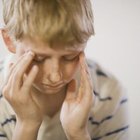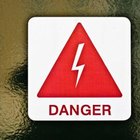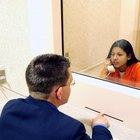
Childhood sexual abuse is a shockingly common and widespread problem. According to a 2003 study in "Child Abuse and Neglect," up to 32 percent of women and 14 percent of men in the United States claim to have been molested as children. Victims of childhood sexual abuse develop a variety of negative emotional and behavioral effects, and these effects often extend into adulthood.
Emotional Damage
Adult victims of childhood molestation exhibit a variety of negative emotional effects of their abuse. The most common symptom is depression, reports Dr. Amy Naugle with the National Violence Against Women Prevention Research Center, and being molested increases an individual's risk of a major depressive episode by four times. According to the American Academy of Experts in Traumatic Stress, a third of adult survivors experience Post Traumatic Stress Disorder, a severe reaction to trauma characterized by depression, anxiety and sleep disturbances that impair an individual's daily functioning. They may also develop low self-esteem, have difficulty trusting other people and feel isolated from others.
Sexual Dysfunction
Being molested can result in sexual dysfunction. Some adult victims avoid sexual intimacy and may even have a phobic response to it. Other victims end up preoccupied with sex. They may become promiscuous and engage in risky behaviors that increase their odds of becoming pregnant, getting their partner pregnant or contracting a sexually transmitted disease, such HIV. A 2010 study in "Child Maltreatment" examining the abuse backgrounds of women at an STD clinic found that childhood sexual abuse was the only form of abuse uniquely associated with risky adult sexual behaviors, such as having many sexual partners and frequently having unprotected sex.
Dysfunctional Relationships
Children who were molested may develop dysfunctional relationships as adults. They have difficulty with intimacy and may keep friends and romantic partners at a distance. Insecurity may lead them to become doormats in their relationships, focused on pleasing the other person. Sometimes child sexual abuse victims even react by becoming the abuser. According to Darlene Barriere, a violence and abuse prevention educator, adult males who were molested as children are 5.43 times more likely to become molesters themselves than men who weren't sexually abused.
Self-Destructive Behaviors
Being molested as a child can lead to a variety of self-destructive behaviors. Adult survivors are seven times more likely to abuse alcohol and drugs than individuals who weren't molested, according to Darlene Barriere, and they are less likely to successfully finish a substance abuse program. They may engage in self-mutilation, cutting and burning themselves. They face an increased risk of developing an eating disorder, particularly bulimia. Barriere also reports that survivors of sexual abuse are 10 times more likely to attempt suicide than those who weren't abused.
Related Articles

Symptoms of Adult Survivors of Child ...

Three Warning Signs of Neglect

Warning Signs That a Women Was Sexually ...

Skin Benefits of Eating Coconut Oil

What Is Identity Crisis During ...

How Does an Overbearing Mother Affect a ...

Psychological Effects of Losing a ...

The Long-Term Effects of Being ...

Aggressive Behavior in Adults

The Effects of a Dysfunctional ...

Psychological Effects of Fatherlessness

Effects of Overbearing Mothers on Their ...

What Are the Advantages of Being the ...

Teens Dealing With Jealous Boyfriends

How to Spot a Promiscuous Girlfriend

The Effects of an Abusive Relationship

Fraxel Laser Treatment Dangers

How Children Are Affected When Living ...

How Does Stereotyping Affect ...

Positive Effects of Dating for Teenagers
References
Writer Bio
Based in southern Idaho, Michelle Johnson started writing in 1991. Her work has been published in the science fiction and fantasy journal, "Extrapolation." Johnson holds a Bachelor of Arts in creative writing and a Master of Arts in fantasy literature, both from Hofstra University in New York.
Photo Credits
Creatas Images/Creatas/Getty Images